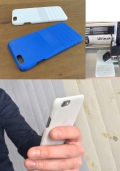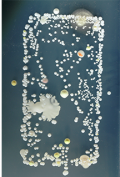Parx Plastics, the Rotterdam-based provider of biocompatible antimicrobial solutions for plastics has now embarked on a project to produce iPhone6 cases incorporating an antimicrobial technology to protect the surface from bacterial contamination.
The company has developed proprietary antimicrobial technology that it now wants to make consumers aware of. It has therefore launched a Kickstarter campaign to “get the technology in the hands of the consumers” – literally, in the form of an iPhone protector. The aim of the campaign is to raise money for the mold needed to produce the case.
 “We are using Eastman Chemical’s Tritan material for it and we have incorporated ourtechnology to get an 98-99% antimicrobial performance,” said Parx Plastics, in a statement. Specifically, the material is Eastman Tritan copolyester TX1501HF, which contains a mold release derived from vegetable based sources. Other outstanding features include good toughness, hydrolytic stability, and heat and chemical resistance.
“We are using Eastman Chemical’s Tritan material for it and we have incorporated ourtechnology to get an 98-99% antimicrobial performance,” said Parx Plastics, in a statement. Specifically, the material is Eastman Tritan copolyester TX1501HF, which contains a mold release derived from vegetable based sources. Other outstanding features include good toughness, hydrolytic stability, and heat and chemical resistance.
“We have created a minimalistic design providing excellent protection against bacteria. The prototypes you see above are made by 3D printing but are not from the material we have selected. The Tritan material we want to use make the product look, transparent, glossy, strong and clear… so quiet a bit different…and you will still be able to see the Apple logo.” The Dr. Parx iPhone 6 protector is planned to be available in 5 different colors.
 A mobile phone, which an average person will touch around 150 times a day, is likely to be dirtier than a public toilet seat, said Parx, citing an article in the Daily Mail, which appeared 13 February 2013. And according to Dr. Simon Park from the University of Surray, UK, this picture shows what a phone may actually be populated with.
A mobile phone, which an average person will touch around 150 times a day, is likely to be dirtier than a public toilet seat, said Parx, citing an article in the Daily Mail, which appeared 13 February 2013. And according to Dr. Simon Park from the University of Surray, UK, this picture shows what a phone may actually be populated with.
Parx Plastics’ technology is based on zinc. The technology, says the company, comes from studying biomimicry. It cannot cause the development of super bugs or antibiotic resistant bacteria, as no ‘antibiotics’ are involved. Materials tested in independent TÜV-certified laboratories and universities using the international standard ISO 22196 showed that when incorporating Parx’ technology, an antimicrobial effect of 99% was achieved on E.coli and of 98% on Staph. Aureus bacteria compared with the same material without the technology. Moreover, it won’t migrate out of the plastic.
Source
Bioplastics Magazine, 2015-05-18.
Supplier
Eastman Chemical Company
Kickstarter Start-up Crowdfunding
Parx Plastics
University of Surrey
Share
Renewable Carbon News – Daily Newsletter
Subscribe to our daily email newsletter – the world's leading newsletter on renewable materials and chemicals










